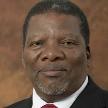Water officials responsible for irregular spending to get second chance - Nkwinti
22 May 2018
Water and sanitation officials who were involved in dodgy practices that contributed to the department's R6.7bn in irregular spending last year are to be given a second chance, Minister of Water and Sanitation Gugile Nkwinti said on Tuesday.
But he will be watching them.
"Part of our responsibility as ministers is to correct (the) conduct of people, not to condemn them. That way we can destroy young people. I can’t do that.
"I am giving them a chance. They are sitting here now. But I will be tough with them if they don’t do what they are supposed to be doing," Nkwinti said at a pre-budget briefing.
Nkwinti, who inherited – from former minister Nomvula Mokonyane – a bankrupt department riddled with mismanagement and irregular spending, said officials had been exposed to "a terrible situation which was tempting… a lot of money moving around when, in some instances, there were no programmes".
There were "billions of rands, just sitting there available", he said.
Nkwinti said last month that he had inherited a department that was "a mess". On Tuesday, he said that, in the short time he had as minister, he wanted to turn the department around so that it carried out its function of serving the people.
He conceded there were plenty of problems, and had told his officials to confront them openly and honestly. He wanted to focus on the future, as he corrected some of the things "which cannot be ignored".
"I said to the team: 'Let’s be frank, because if we are not frank, we will never be trusted'."
The department had a budget of R15.5bn, Nkwinti said. Part of this would have to be spent on dealing with irregular spending from the last financial year.
"In certain instances, contracts without value have been entered into. An example is the bucket eradication programme that led to unauthorised expenditure," he said.
He would go to court to get all open-ended contracts and deals declared null and void.
He also intended establishing a national water resources authority, using the Eskom model, and a national water resources and services regulator.
Another issue he would tackle was to engage with National Treasury and the Department of Cooperative Governance and Traditional Affairs, to deal with the billions of rand that the department had given to municipalities in the form of grants, but which the municipalities had not spent, or had spent irregularly.
Other issues he would tackle included instituting disciplinary management in the department, which would include law enforcement agencies where necessary; hastening the establishment of Water Catchment Management Agencies in provinces; establishing a national water resources and services advisory council; and rebuilding the department’s construction unit to become a state-controlled construction company.
Asked how he was working with the Western Cape and its "political musical chairs", Nkwinti said he had received an invitation from Cape Town Deputy Mayor Ian Neilson to have a meeting. However, he did not want to make the mistake of meeting him while Patricia de Lille was still mayor.
"I don’t want to enter that space."
He would, therefore, wait a while before meeting the city's leadership.
"But, in the meantime, we are dealing very well with the premier (Helen Zille) and (local government MEC) Mr (Anton) Bredell."
Nkwinti said he was presenting the budget during the centenary year of revered icons of the struggle, Nelson Mandela and Albertina Sisulu, which served as a reminder of the values that the freedom movement had stood for – honesty, sacrifice and integrity.
"If we remember them without these values, it means nothing."

